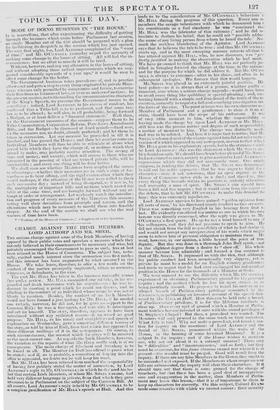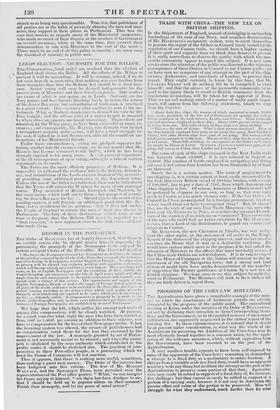CHARGE AGAINST THE IRISH MEMBERS. LORD ALTHORP AND MR. SHEIL.
THE serious charge against some of the Irish Members, of having opposed by their public votes and speeches a measure which they not only believed in their consciences to lie necessary and wise, but privately encouraged the Government to pass as such, has at last been uttered in the House of Commons. The subject has, naturally, excited much interest since the accusation was first made; and this interest has been augmented by what occurred in the House. We take leave, therefore, to offer a few words on the conduct of the parties principally implicated, either as accusers, witnesses, or defendants, in the case.
The r art Mr. Him. has taken in the business flannelly crimes first under review. Mr. Hi LL committed one mi-take, in his un guarded awl frz.nk intercourse with his constitiwos : he was indiscreet in mooting a point which Ito could not discuss, and in alluding to the conduct of in individual whose name he was not at liberty to mention. Besides, the conduct of an I ri h Member would not have formed a just apology for Mr. HILL, if he needed one (which, however, he did not, for he gave no support to the Coercion Bill): he was a free agent, and very able to investigate and net for himself. The story, therefore, appeaN to have been introduced without any sullicient reason—it an,wei.«1 no good purpose. Mr. HILL, in his manly and stritighttlx%, aid speech of explanation on iVednesday, gave a somewhat different version of the story, as told by him at Hull, from that which has appeared in three different readings of it in the newspapers. Of course, in such circumstances, the account which he gives will be received Os the most correct one. As regards the Irish illembeis, however, the variation in the reports of what Mr.1111.1. really sUid, is of no consequence. The main charee of fidsehood and treechery is to be found in all. The Member for Ilull has offered to prove what he stated ; and if, as is probable, a committee of inquiry into the affair is appointed, we doubt not he will keep his wool.
But Mr. HILL has been relieved from much of the responsibility
of having first publicly stated the matter of accusaticu, by Lord ALTHORP'S reply to Mr. O'CONNELL ; in which he dee'ared his belief that certain Irish Members, of whom Mr. SHEIL 1-■ as one, had held very different language in private, from that which they gave utterance to in Parliament on the subject of the Coercion Bill. At all events, Lord ALTenene's reply isheld by Mr. O'CONNELL to be a complete justification of Mr. HILL'S speech at Hull. And this leads us to the consideration of Mr. O'CONNELL'S behaviour" Mr. HILL during the progress of this question. Every one ta members the savage vehemence with which he denounced him t his constituents as a foul slanderer he was " convinced the Mr. HILL was the fabricator of this calumny ;" and he did ni hesitate to declare his belief, that he could not " possibly adduc the name orally living person flrom whom he heard the tale." No mark the reckless blundering of the Agitator. Lord ALTHOM says that he believes the tale to be true : and then Mr. O'CONNE starts up, and in the most sweeping manner retracts all that It has uttered against Mr. HILL, who, he now discovers, was "per feetly :justified in making the observation which he had made. We have misumed to think that Mr. IT'LL was not perfectly ju, tilted in bringing forward the charge at the time, in the =tine' and for the purpose for which he did adduce it. But Rh. O'Cos• NELL is always in extremes—ultra in his abuse, and ultra in in subsequent apologies. We foresaw that this would happen. Mr. SHEIL was placed in an extremely painful position. Hi, best policy—as it is always that of a person, whether guilty o: innocent, over whom a serious charge impends—would have been to avoid every thing like quibbling or special-pleading ; and, con tenting himself with a simple and firm denial of the truth of' the ac cusation, earnestly to request a full and searching investigation int. the facts of the case. The point at issue was his own character as s Member of Parliament and a gentleman : to clear it from al. stain, should have been the scope of his endeavour. It wa, of very little moment to him, whether the responsibility re having made the charge lay upon Lord A LTHORP or Mr. Hi i,n: still less was the precise nature and degree of such respousibilit■ a matter of moment to him. The charge was distinctly made. and was to be refuted. And here it is impostant to notice, that Ms L's solemn denial of' the charge against him did not refer to ths I version of it which appeared in any newspaper, or even to that w his Mr. HILL gave in his explanatory speeele but to the statenwit inad, by Lord ALTHOEP : this was the statement which Mr. Suet I, nee by a denial on oath. We should have been better pleased if Mr. SIMI:. had not evinced so touch anxiety to give a colour to Lord A LTHOit expressions which they did not necessarily wear. One tingle suppose, in reading the debate, that Mr. Sue t T. WES determined to call out his noble opponent—that he was eager to light for a character—were it not notorious, that an open rupture in tlit House of Commons never ends in a duct ; and theref ■re, that every thing like bravado within its preeints is perfectly ridiculous and unworthy a man of spirit. Mr. SHEIL'S aim should have been a full and free inquiry ; but it would seem from the report of the debate, that he left Mr. O'CONNELL to make this demand for him : this was extremely injudicious.
Lord ALTHORP appears to have gained "golden opinions front all sorts of men,by his direct and manly conduct on this occasion..
There was something very English in his bearing from first ti last. He evidently considered the matter as one in which his own
honour was directly concerned, after the reply was given to Mr.
O'CONNELL'S first query. He spike not a word himself to any (Jr *his colleagues, and they did not presume to speak to hint. Hr did not shrink from the full responsibility of what he had declared. and would not accept any interpret:trim of his words whieh might seem to relieve hint of personal obligation to maintain them. He went, however, in our opinion, a little beyond the point of true dignity. But this was done in a thorough John Bull spirit,—not in the slightest degree from a desire to "show or' II is whole manner became him admirably ; and formed a fine contrast e: that of Mr. Sum. It impressed us with the idea, that although his public conduct had been occasionally very slippery, yet in private he must be a model for an English country gentleman and made us regret that he had ever exchanged his indepeudent position in the House for the trammels of a Minister of State. We were amused to see the difficulty which Mr. 0 CONNELL experienced in obtaining Parliamentnry ground fir his pi-oposed inquiry ; and the method which he hums hit upon strikes its ti.c. being peculiarly absurd. He proposes to found his motion on an alleged breach of Parliamentary privilege committed by the Examinrr, in publishing an incorrect account of the spe:.ch delivered by Mr. Him. at Hull. How this can be held lobo a breach of Parlianpartary privilege, it is for the Rlilesian intellects to clear up. Does every spot of ground which a Member of Par/ia, ment touches become invested at once with the sacred privileges of St. Stephen's Chapel ? But then, a precedent was wanted. The Members will only proceed in the saute track as their ancesters. What folly is this! Why not make a precedent, and found a motion for impiiry on the assertions of Lord ALTI10:ZP and the denial of' Mr. SHEIL, pronounced within the walls of the house, in the hearing of some hendred Members? It is a subject fit for inquiry ; and if the House wishes to institute
one, why not set about it in a rational manlier? There may be " difficulties" and "inconveniencies," and so forth ; hut they
must be overcome, for tins farm clamosa cannot rest where it is at.
present—the scandal must be purged. Good will result from the inquiry. If' there are any false Members in the I louse, they ought to be unmasked aed exposed. If the Members on whom suspicion nor
falls are calumniated, the inquiry will clear their characters. If' it
should turn out that there is some ground for the charge of treachery, limit that the:0 has been a good deal of' misapprehen sion and exageeration in the matter, then Members of Parlia
ment may leaen this lesson,—that it is of importance to them to keep up characters for sincerity. On this subject, Colonel EVANS
made some remarks with which we cannot concur : their morality
struck us as being very questionable. True it is, that politicians of all parties are in the habit of privately abusing the men and measures they support in their places in Parliament. This was the case last session, as regards many of the Ministerial supporters; who made no secret of their disgust at the conduct of Government on several occasions, while at the same time, they avowed their determination to vote with Ministers to the end of the sessise. There must be an end of all this paltry insincerity : we must raise the standard of morality in public then.



















 Previous page
Previous page